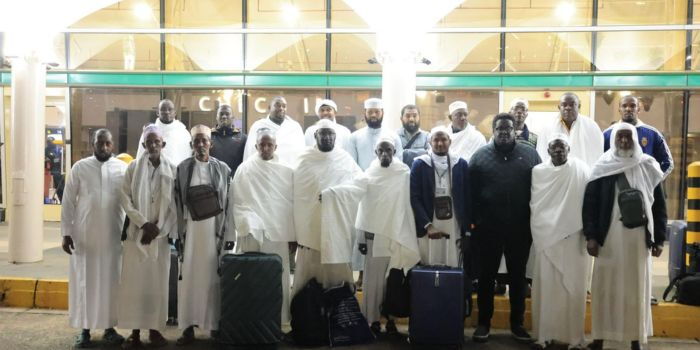In a rare and heartfelt act of generosity, Nairobi County Governor Johnson Sakaja has fully sponsored 47 Muslim clerics from economically disadvantaged areas of the city on a life-changing journey to perform Hajj, the sacred pilgrimage to Mecca. The group of imams departed from Jomo Kenyatta International Airport on Monday morning, embarking on what is regarded as the pinnacle of spiritual fulfillment in Islam.
This noble gesture by Governor Sakaja covered all travel and accommodation expenses, enabling the clerics, many of whom had never imagined being able to undertake the pilgrimage due to financial constraints, to take part in one of the Five Pillars of Islam. The imams were drawn from various communities within the county, including Kibera, Majengo, Maringo, and Utawala, areas often associated with socio-economic challenges.
During the official send-off, Ustadh Hassan Amin, Chairperson of the Council of Imams and Preachers of Kenya, expressed deep gratitude to the governor, describing the initiative as a divine blessing. He noted that the Hajj is not merely a physical journey to the Holy Land but a profound spiritual experience that demands humility, reflection, and sincere devotion to Allah.
“We are privileged by Allah to go and worship Him in the holiest of places. This journey signifies more than just travel—it is an act of faith, a display of obedience, and a manifestation of unity among Muslims across the globe. We sincerely thank the Governor for making this dream come true for our brothers,” said Ustadh Amin.
He further added that gratitude to fellow human beings is a key tenet of Islamic ethics. “If one cannot express appreciation to those who do good to them, they cannot fully show gratitude to Allah. That is why we must acknowledge this tremendous support from the Governor.”
The Hajj pilgrimage, which takes place annually in the Islamic month of Dhul Hijjah, from the 8th to the 12th, commemorates the trials and unwavering faith of Prophet Ibrahim (Abraham), his wife Hajar, and their son Ismail. It represents one of Islam’s core pillars, alongside the declaration of faith (shahadah), five daily prayers (salat), obligatory charity (zakat), and fasting during the month of Ramadan (sawm).
Hajj is compulsory for all Muslims who are physically and financially able to perform it at least once in their lifetime. For many of the imams sponsored by Governor Sakaja, this journey is not only a fulfillment of a religious obligation but a transformative spiritual milestone.
Globally, the pilgrimage attracts millions of Muslims annually. According to published statistics, between the years 2000 and 2019, an average of 2.2 million pilgrims participated each year, with over 1.5 million coming from outside the Kingdom of Saudi Arabia. The year 2012 recorded the highest number of pilgrims, with over 3.1 million individuals in attendance.
By enabling these imams to perform Hajj, Governor Sakaja has not only provided personal spiritual upliftment for the clerics but has also strengthened the moral and spiritual fabric of the communities they serve. As the sacred days of Dhul Hijjah approach, this initiative has been widely praised as a model of leadership rooted in inclusiveness, compassion, and respect for religious values.

